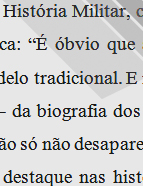

................................
Military h istory was closely connected to studies of strategy and tactics, based on examples from past campaigns, in order to anticipate and guide the planning and execution of military operations. It shared the basic elements of g eneral h istory while occupying a privileged space within it: the description of campaigns, battles, great military leaders, and their exploits. However, it was against this historiographical trend rooted in événementiel political-military history and the political legitimisation of history (particularly within p olitical h istory) that the process of military historiographical renewal would take place. Nevertheless, it is essential not to conflate the use of historical memory by the military with traditional political-military history, nor with the respective processes of critical and scientific revision .
Outlining a sketch of this scientific evolution, the aim is to contribute to methodological and historiographical discussions within this field of historical studies, fostering debate on interpretations of m ilitary h istory and assessing the tensions between conservative and more recent historiographical trends. The approach to writing history was predominantly patriotic, with a strong affinity for the mediaeval period, which was seen as the era of the emergence of national identities. It was a time of extensive cultural and scientific dissemination, during which the reading public expanded considerably. Historians were also journalists and opinion leaders, such as Alexandre Herculano (1810–1877) and Manuel Pinheiro Chagas (1842–1895), who interrupted his career as a captain but profoundly influenced his historiographical writing with a distinctly military character.
An enduring concept of Volksgeist —the evocation of the soul of the people or the national spirit—would emerge in historical texts, inspiring heightened patriotism and the uncompromising defence of civic consciousness. The establishment of history as a scientific discipline, driven by Romanticism, tended towards the veneration of national history, a trend that was equally evident in military themes. Among numerous examples, crucial works emerged, including Mélanges Militaires, Littéraires et Sentimentaires (1795–1811) by Charles-Joseph, Prince of Ligne (1735–1814); Handbuch der Artillerie (1804) by Gerhard von Scharnhorst (1755–1813); Vom Kriege (1832) by Carl von Clausewitz (1780–1831); and Précis de l’Art de la Guerre (1836) by Antoine-Henri Jomini (1779–1869), alongside many other works by erudite authors who were both military professionals and academics.
This work is financed by national funds through FCT - Foundation for Science and Technology, I.P, in the scope of the projects UIDB/04311/2020 and UIDP/04311/2020.
